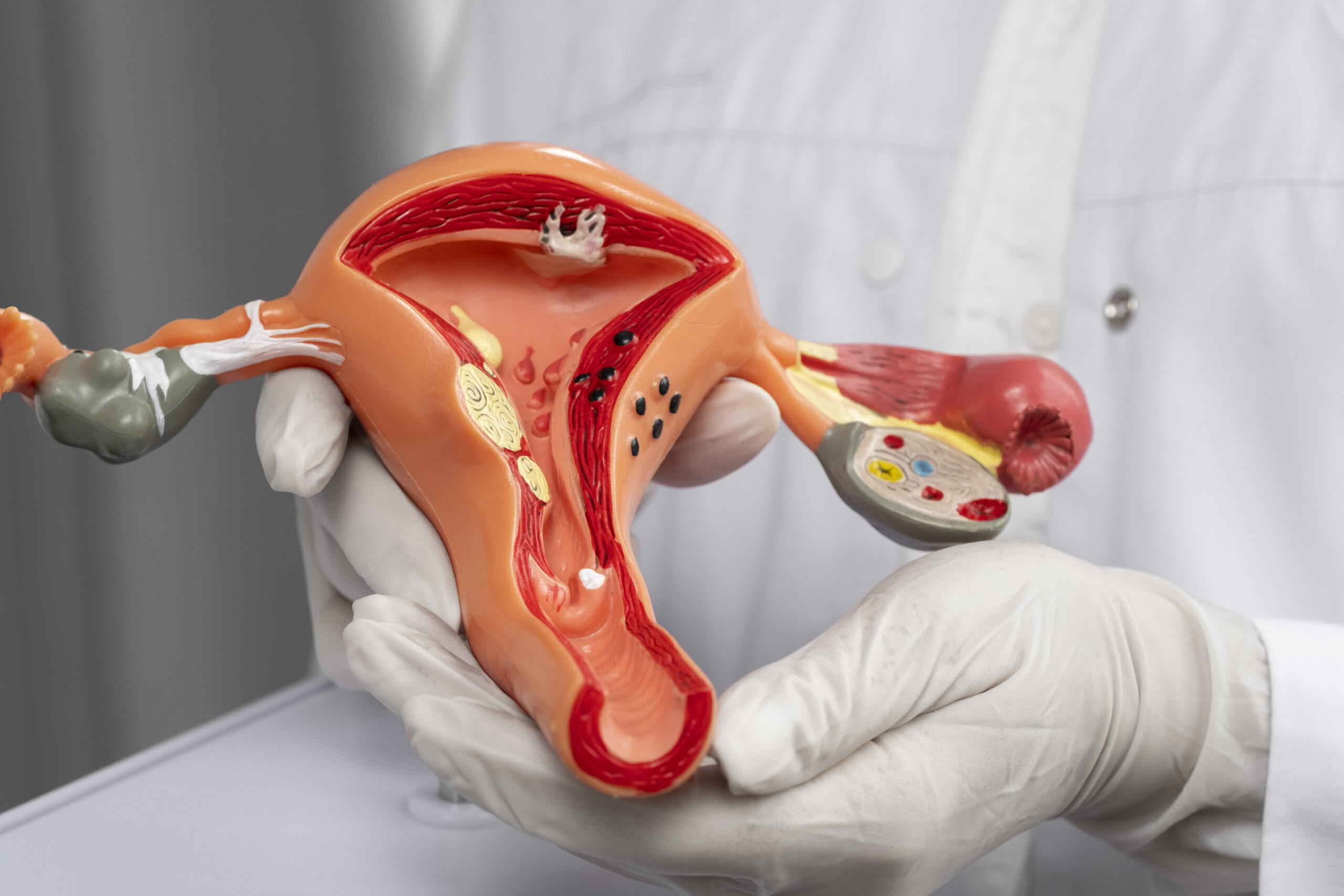PCOS
Home
Our Services
PCOS
Hormonal imbalance in women is a common concern, affecting various aspects of health, including menstrual cycles, fertility, and metabolism. One of the most prevalent conditions caused by hormonal imbalance is PCOS (Polycystic Ovary Syndrome). PCOS affects millions of women worldwide, often causing irregular periods, acne, weight gain, and difficulty conceiving.
Understanding the causes, symptoms, and treatment options for PCOS is essential for managing this condition effectively. Both modern medicine and Ayurvedic remedies for PCOS provide approaches to restore hormonal balance and improve overall well-being.
Wrong life style and food habits, impact the normal functioning of the hormones. This leads to hormonal imbalance and the egg in the ovary is not released.This in future does not signal the uterus to bleed. That’s why we see a lot of non-bleeding phase or delayed cycles in females. Some go without periods for months.
Polycystic Ovarian Syndrome/Disease is a common lifestyle disorder.It results in irregular menstruation, high level of androgens (Male Hormones)and anovulation and can lead to infertility. PCOS has been associated with high risk of developing type 2 diabetes, hypertension, heart disease, high cholesterol. It also has significant mental health and psychological impact, impairing quality of life.

Causes of PCOS :
PCOS is primarily caused by hormonal imbalance in women, particularly elevated levels of androgens (male hormones). Several factors contribute to its development:
- Insulin Resistance: Many women with PCOS experience insulin resistance, which increases insulin levels in the body, stimulating excess androgen production.
- Genetic Factors: PCOS can run in families, suggesting a genetic predisposition.
- Lifestyle Factors: Sedentary lifestyle, poor diet, and stress can exacerbate hormonal imbalance.
- Inflammation: Chronic low-grade inflammation can trigger increased androgen production, worsening symptoms.
Symptoms linked to hormonal imbalance in women with PCOS include irregular periods, ovarian cysts, acne, excessive hair growth, weight gain, and hair thinning.
Why PCOS Happens:
PCOS happens when the ovaries produce too many male hormones, disrupting the menstrual cycle and preventing regular ovulation. Hormonal imbalance in women affects estrogen, progesterone, and androgen levels, leading to:
- Irregular periods or missed cycles
- Difficulty conceiving due to anovulation
- Insulin resistance and weight gain
- Skin issues like acne or oily skin
- Hair thinning or hirsutism
The exact reason for PCOS is multifactorial, combining genetic, hormonal, and environmental factors. Early diagnosis is critical to prevent long-term complications such as type 2 diabetes, heart disease, and infertility.
How People Suffer from PCOS
Women with PCOS often struggle with multiple physical and emotional challenges:
- Menstrual Irregularities: Missed or irregular periods create anxiety about fertility.
- Weight Gain: Insulin resistance contributes to stubborn weight around the abdomen.
- Skin and Hair Issues: Acne, oily skin, and excessive hair growth affect self-esteem.
- Fertility Concerns: Difficulty conceiving can lead to emotional distress.
- Long-Term Health Risks: Diabetes, cardiovascular issues, and endometrial cancer risk increase.
Methods of Curing PCOS:
1. Medical Treatments
- Hormonal Therapy: Doctors may prescribe oral contraceptives or anti-androgen medications to balance hormones.
- Metformin: Helps improve insulin sensitivity and regulate menstrual cycles.
- Fertility Medications: Clomiphene citrate or letrozole may be used to induce ovulation in women trying to conceive.
2. Ayurvedic Treatments for PCOS
Ayurveda treats PCOS by addressing the root cause—hormonal imbalance in women—and restoring dosha equilibrium. Common therapies include:
- Herbal Remedies: Ashwagandha, Shatavari, and Triphala to balance hormones.
- Panchakarma Therapy: Detoxification procedures to reduce metabolic toxins.
- Lifestyle Management: Yoga and meditation to reduce stress and improve hormonal balance.
3. Dietary Approaches (PCOS Diet)
Foods to Include:
- Whole grains and fiber-rich foods to regulate insulin
- Lean protein sources like legumes and tofu
- Anti-inflammatory foods such as turmeric, ginger, and leafy greens
Foods to Avoid:
- Sugary and processed foods that increase insulin resistance
- Refined carbs like white bread, pastries, and sugary drinks
- Excess dairy and fatty foods
4. Exercise and Lifestyle
Regular exercise improves insulin sensitivity and supports weight management. Recommended activities:
- Brisk walking or jogging (30 min/day)
- Yoga poses like Surya Namaskar and Bhujangasana
- Strength training to build muscle and improve metabolism
Conclusion
Hormonal imbalance in women is a leading factor behind PCOS. Understanding its causes, symptoms, and treatment options is essential for long-term health. A combination of medical interventions, Ayurvedic remedies, balanced diet, regular exercise, and stress management helps restore hormonal balance and improves overall well-being. Women experiencing PCOS should consult healthcare professionals for personalized care and follow a consistent lifestyle plan for effective results.
FAQ
PCOS (Polycystic Ovary Syndrome), also called PCOD (Polycystic Ovarian Disease), is a hormonal / metabolic disorder in which hormonal imbalances lead to ovulation problems (often anovulation) and raised androgen levels. Healing Earth describes it as a “common lifestyle disorder” involving irregular menstruation, high androgens, and failure of the egg to be released. HealingEarth
Healing Earth explains that under normal physiology, the hypothalamus triggers the pituitary to secrete FSH and LH, which in turn regulate estrogen and progesterone. In PCOS, this hormone balance is disturbed, ovulation may not occur, and the uterus may not receive the signal to shed the lining, leading to irregular or absent periods.
PCOS is associated with an increased risk of type 2 diabetes, hypertension (high blood pressure), heart disease, and elevated cholesterol. It also can have psychological and mental health impacts, affecting quality of life.
